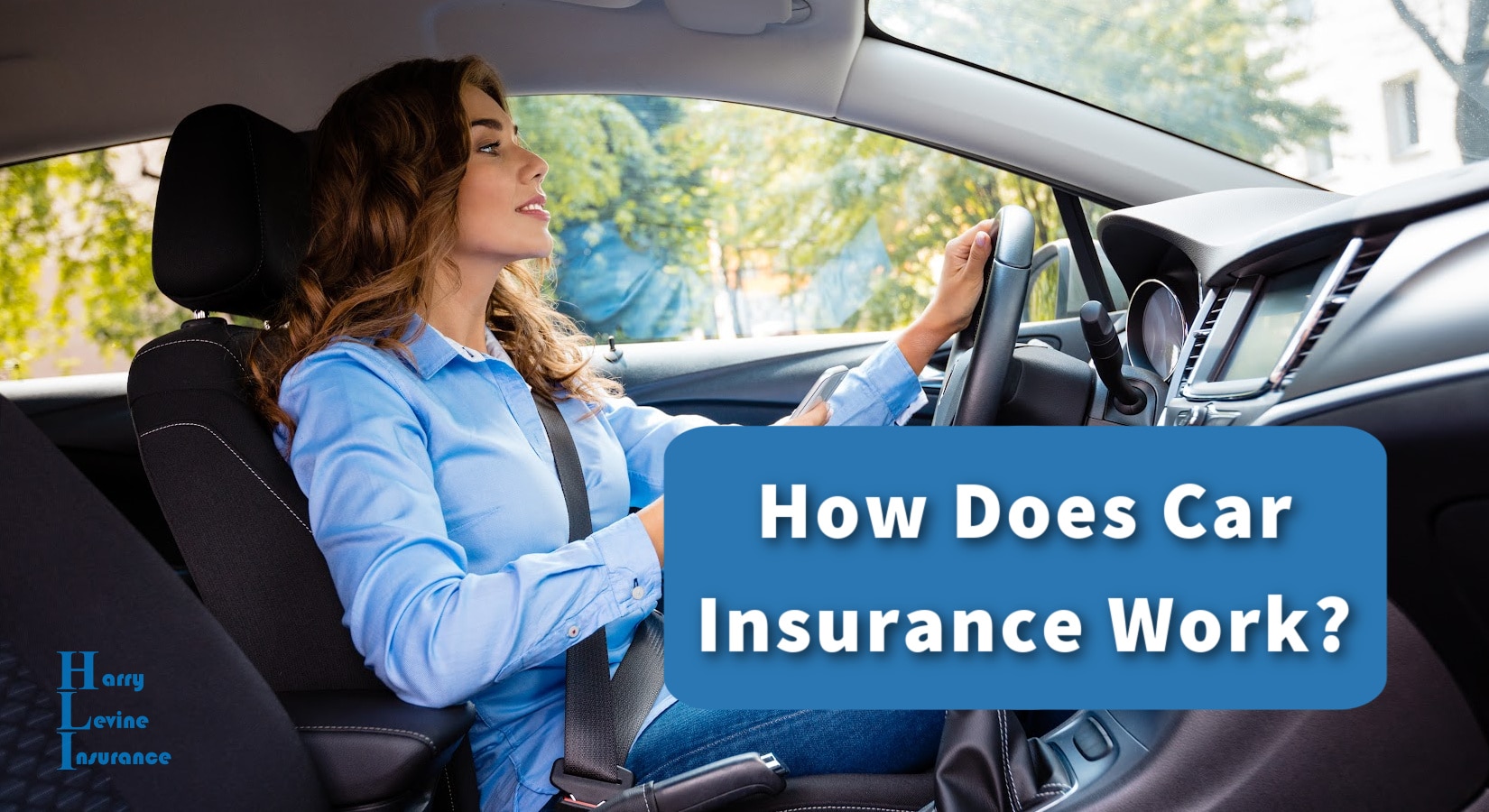Your insurance policy shouldn’t confuse you.
Let’s examine how car insurance works to better understand your coverage.
Car insurance can be daunting and confusing, but it’s an essential part of owning and operating any vehicle. Not only is car insurance required by law in most states, it also provides financial protection and peace of mind against accidents, theft, damage, and hit and runs.
If you’re confused and constantly asking yourself “How does car insurance work?” know that you’re not alone. Read on for more information about car insurance, how it works, and how Harry Levine Insurance will help you through the process.
The Basics of Car Insurance
Essentially, car insurance is a contract between you and your insurance company.
In exchange for paying your premiums, the insurance company agrees to pay for specific car-related financial losses during the term of your policy. You have choices in regards to coverage, but it’s essential to understand what your particular policy covers so that you’re never left confused.
Here are some basic types of car insurance coverage:
- Liability: This is the most basic form of car insurance and is the one that is typically required by law. It has two main components: Bodily Injury Liability and Property Damage Liability. Bodily injury liability covers medical expenses, wages, and other costs for people injured in a car accident that you cause. Property damage liability does the same but for people’s property.
- Collision Coverage: This pays for the repairs to your vehicle if it’s damaged in an accident—no matter who is at fault. If the worst happens and your car is totaled, collision coverage will pay the cash value of your vehicle before it was damaged.
- Comprehensive Coverage: This type of coverage is for damage caused to your vehicle that is not caused by a collision. Things like theft, vandalism, natural disasters, and falling items are typically covered. Random trivia knowledge: collision with animals is typically covered under Comprehensive instead of Collision.
- Personal Injury Protection (PIP) or Medical Payments: These cover medical expenses for you and your passengers after an accident, regardless of fault. In Florida, drivers are required to carry at least $10,000 of Personal Injury Protection.
- Uninsured/Underinsured Motorist Coverage: If you’re involved in an accident with a driver who doesn’t have insurance (or doesn’t have enough insurance), this covers you.
- Gap Insurance: If you have a loan or lease on your vehicle, gap insurance will cover the difference between what you owe and the car’s actual cash value in the event that it’s totaled.

How Car Insurance Premiums are Determined
Just like no two people are alike, neither are any two car insurance policies. We all have different needs, so this is how the price is determined:
- Driving Record: A clean driving record will typically result in lower premiums while accidents or major traffic violations will increase your rates.
- Age and Gender: Younger drivers and males can expect higher premiums due to their higher risk of accidents.
- Location: Where you live can impact your rates. Places with more traffic tend to see higher rates than rural areas.
- Vehicle: Your vehicle also plays a role in determining your premiums. The make, model, and year of your car are all factored into your rates.
- Credit Score: In many states, insurers will use your personal credit score to determine your rates.
- Personal Coverage/Deductible: Choosing higher coverage and lower deductibles will increase your premium while lower coverage and higher deductibles will reduce them.
How to File a Car Insurance Claim
Let’s say the worst happens and you’re involved in a car accident. How does car insurance work then?
File a Claim
It’s imperative that you contact your insurance company immediately following an accident. If you’re not sure of your first steps, call Harry Levine Insurance. As an independent insurance agency we can’t do it for you, but we’ll make sure you have the tools and help that you need.
Be sure to note the date, time, location, and circumstances of the collision.
Document Everything
Take photos of the damage to your car, any other vehicles involved, and any property damage that you see resulting from the collision. Collect all information from the other drivers, passengers, and any witnesses.
Call Law Enforcement
They will write up a police report and apprise you of anything you need to know about the collision. They may issue tickets, but don’t panic. Just take the information so that you have it for your insurance.

Get Repairs
Once your claim is filed and approved, you can take your car to an approved shop. Keep all of your receipts and documents.
Settlement
If your car is totaled, the insurance company will provide you with a settlement of your car’s value. If repairs are needed, your insurance will pay the shop directly or reimburse you for your costs.
Why Car Insurance Is Important
Although car insurance is usually required by law, that is not the only reason that you should have it.
Car insurance provides important financial protection as well as financial security, legal protection, and peace of mind. Trust us, you don’t want to become destitute because you didn’t have the proper coverage!
Car Insurance Is a Responsibility to Yourself and Others
Having adequate car insurance is an essential part of being a responsible vehicle owner. It provides financial protection in the event of an accident.
By understanding how car insurance works and the various options of coverage, you can make informed decisions about your policy and what your individual needs are.
Whether you’re a new driver or a seasoned one, being well-informed will help you get the best protection insurance companies offer. For individualized assistance from an independent insurance agency who will treat you like family, give Harry Levine Insurance a call. We are happy to provide you with free quotes and the information you need to stay safe on the road.
